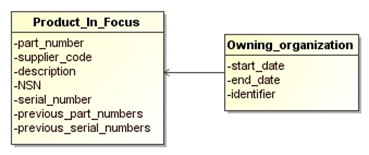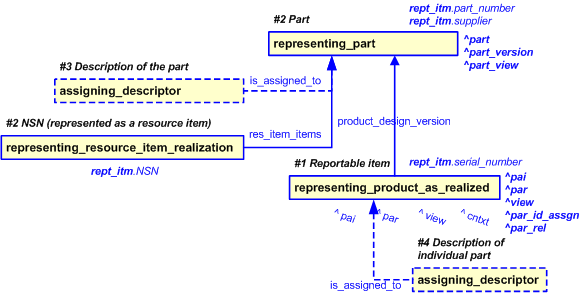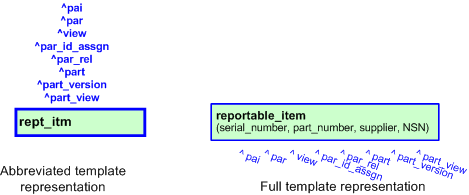Template:— reportable_item (rep_itm)
Context:— MoDAvDEX |
Date: 2008/01/28 11:50:29
Revision: 1.15
|
NOTE
The template has been defined in the context of
MoDAvDEX.
Refer to the business context for details of related templates.
NOTE
An explanation of a template and the associated instantiation path is
provided in the
Template overview
section.
The following input parameters are defined for this template:
The following reference parameters are defined for this template:
The following parameter combinations specify a uniqueness constraint:
The instantiation path shown below specifies the entities that are to be
instantiated by the template.
-- instantiate the reference part -- Note it is assumed that the part is not versioned /
representing_part(
part_id=@part_number,
part_id_class_name='Part_identification_code',
part_id_ecl_id='urn:plcs:rdl:std',
part_org_id=@supplier,
part_org_id_class_name='NCAGE_code',
part_org_id_ecl_id='urn:plcs:rdl:std',
part_vn_id='/NULL',
part_vn_id_class_name='Version_identification_code',
part_vn_id_ecl_id='urn:plcs:rdl:std',
part_vn_org_id=@supplier,
part_vn_org_id_class_name='Organization_name',
part_vn_org_id_ecl_id='urn:plcs:rdl:std',
domain='Product_life_cycle_support',
domain_ecl_id='urn:plcs:rdl:std',
life_cycle_stage='Utilization_stage',
life_cycle_stage_ecl_id='urn:plcs:rdl:std')/
%^part = $representing_part.part%
%^part_version = $representing_part.version%
%^part_view = $representing_part.view%
-- instantiate representing_product_as_realized -- Note - it assumed that the item is not versioned /
representing_product_as_realized(
id=@serial_number,
id_class_name='Serial_identification_code',
id_ecl_id='urn:plcs:rdl:std',
id_owner=@supplier,
id_owner_class_name='NCAGE_code',
id_owner_ecl_id='urn:plcs:rdl:std',
vn_id='/NULL',
vn_id_class_name='Product_as_individual_identification_code',
vn_id_ecl_id='urn:plcs:rdl:std',
vn_id_owner=@supplier,
vn_id_owner_class_name= 'Organization_name',
vn_id_owner_ecl_id='urn:plcs:rdl:std',
life_cycle_stage='Utilization_stage',
life_cycle_stage_ecl_id='urn:plcs:rdl:std',
domain='Product_life_cycle_support',
domain_ecl_id='urn:plcs:rdl:std',
product_design_version=^part)/
%^par = $representing_product_as_realized.par%
%^pai = $representing_product_as_realized.pai%
%^view = $representing_product_as_realized.view%
%^par_rel = $representing_product_as_realized.par_rel%
%^par_id_assgn = $representing_product_as_realized.par_id_assgn%
-- instantiate representing_resource_item_realization for the NSN /
representing_resource_item_realization(
res_item_id=@NSN,
res_item_id_class='NSN_code',
res_item_id_ecl_id='urn:plcs:rdl:std',
res_item_id_org_id='LITS',
res_item_id_org_id_class='Organization_name',
res_item_id_org_id_ecl_id='urn:plcs:rdl:std',
res_item_items=^part)/
The following section details how the
reportable_item
template can be optionally characterized by assigning
other constructs to it. These are characterizations commonly
applied to the template. The ISO 10303-239 EXPRESS model may enable
other assignments to the entities instantiated by the template.


